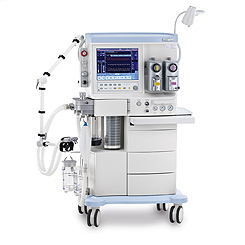Leon plus Универсальный наркозно-дыхательный аппарат
Формед — официальный поставщик Страна производства: Германия ↳ Все товары Loewenstein Medical
Цена: по запросу
Цена и наличие зависит от конфигурации
Обращаем Ваше внимание, что информация на сайте не является публичной офертой, носит информационный характер, может быть изменена без уведомления, подлежит уточнению при заказе и не является основанием для претензий.
Купить в 1 клик
Менеджер по этому товару
Оптова Валентина
Для запроса коммерческого предложения рекомендуем направлять название и ИНН конечного медицинского учреждения.
LEON PLUS — это современная анестезиологическая станция экспертного уровня, которая позволяет реализовать анестезию по открытому, полуоткрытому и полузакрытому контурам, включая ингаляционную анестезию минимальными потоками и подходит для использования у всех групп пациентов. Современная рабочая станция LEON PLUS предназначена для проведения анестезии у взрослых, детей и новорожденных.
Функции и режимы:
- Вентиляция с гарантированным дыхательным объемом — PCV – VTG;
- Мониторинг пациента при регионарной анестезии – MON;
- Вентиляция с поддержкой давлением PSV (ASSIST);
- Режимы вентиляции: IMV, SIMV, SPCV, Man./Spont, HLM;
- Электронный смеситель газов, с диапазоном потоков от 200 мл/мин до 18 л/мин.;
- Неонатальная вентиляция – ДО от 3 мл.;
Особенности модели:
- Сенсорный 15” дисплей обеспечивает легкое управление и контроль параметров с отображением трендов до 72 часов. Возможно отображение до 4-х кривых и 3-х петель в реальном времени;
- Встроенный мультигазовый анализатор с автоматическим определением анестетика;
- Парамагнитный датчик кислорода;
- Надежный электронно-управляемый вентилятор с пневматическим приводом;
- Система «мех в бутылке» с компенсированной податливостью;
- Электронный ротаметр с широким диапазоном регулировок скорости потока;
- Электронное управление установками свежего газа гарантирует точную дозировку и защищает от ошибочных установок;
- Легкая замена абсорбера даже в процессе работы;
- Встроенная система аспирации;
- Возможность крепления двух испарителей;
- Возможна комплектация с монтажом на потолочную консоль или с креплением к стене.
Услуги
Продажа и обслуживание автомобилей
Тумба Леон 13 BMS может задействовать угловое пространство комнаты, дополнить шкаф или стеллаж. Удобная система хранения включает в себя вместительное распашное отделение, оснащенное ручкой-рейлингом, и открытые полки. Скругленные углы полок и боковины смягчают строгие линии корпуса, а ярким интерьерным акцентом станет цветной фасад, украшенный фрезеровкой в стиле сканди. Купить тумбу Леон 13 BMS вы сможете в нашем интернет-магазине, подобрав необходимые размеры и цвет.
Либо можно сделать ставку экспрессом, но одну, где необходимо, чтобы одно событие было с коэффициентом от 2.
Для отыгрыша участнику необходимо использовать всю сумму фрибета для одной одиночной LIVE- или прематч-ставки на событие из топ-лиг: Ла Лига (Примера), Серии А или Лиги 1 с коэффициентом исхода от 1.70 до 3.00.
Модульная система Гостиная ЛЕОН от Глазов мебель – это ваш выбор! Мы являемся лидерами по продажам гостиной ЛЕОН и готовы предложить ее по лучшей цене в нашем интернет-магазине мебели.
Читайте вместе с Автоматы Леон Бетс Com Зеркало ищут:
- Leonbets Автоматы
- Leonbets Установить
- Leon Ru Букмекерская Контора
- Леон Букмекерская Контора Горячая Линия
- Бк Леон Актуальное Рабочее
- Букмекерская Контора Леон Бетс
Сэкономьте время, сравнив сразу все варианты автобусных поездок.
РАБОЧЕЕ ЗЕРКАЛО БК СЕГОДНЯ — ВОЙТИ НА ЗЕРКАЛО


